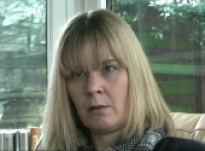Jane - Interview 28

More about me...
Jane, aged 41 years, is White British and works full time in Primary School Education. She lives with her husband and their daughter who is 13 years of age. Their daughter was diagnosed with Juvenile Diabetes at the age of 11. In 2010 Jane and her daughter Saskia attended a routine clinic visit at which they were asked to participate in a trial.
Jane and her daughter took part in a trial to compare treatment options for children and young people with diabetes; they were randomised to receive the new information pack.
Jane and her daughter took part in a trial to compare treatment options for children and young people with diabetes; they were randomised to receive the new information pack.
Yes, yes, I think we got a big, we got a pack there and then I think, if we said yes, I think. Saskia came; I think that’s when Saskia came away with a big file full of lots of information. And my understanding was, thinking back, that the trial was to help them decide whether on diagnosis as a child, I think it’s going to be for, Saskia’s category was sort of teenage because by that time she was 12½, so I think she was in the sort of, that juvenile rather than young child, what support is given on diagnosis. Is it this big pack that she then got, which has got all the information and is child friendly, that’s written for children? Or do we do it in the way we’ve, they’ve done it where, they did give us a pack and some information at the start and then drip-fed some of the information through the diabetic nurse? But I don’t really know how it will be completely different, because I’m assuming you would still get support of the diabetic nurse, and this is just an information pack.
The questions in the questionnaire they had to complete weren't about diabetes. It was more to do with feelings and problems with daily life.
The questions in the questionnaire they had to complete weren't about diabetes. It was more to do with feelings and problems with daily life.
It is literally just as you’re at the diabetic clinic, each time you go there is a, an A4 pack of information asking you to score a series of questions related to physical health. So, what, Saskia’s health over the last month. So it would have an example question like, “Saskia’s been unable to exercise at school” and then it would be, “Never, sometimes” to, “Yes” do you know what I mean? And then it would have some things relating to how Saskia feels, like, “Saskia feels sad” or, “Saskia feels embarrassed” or, do you know what I mean? about the diabetes. She would have to answer them. She just goes through it going, “Never, never, never, never, never.”
It was an easy decision to take part in a trial of different types of information, but if the trial had been about something else they might have needed more time and opportunity to ask more questions.
It was an easy decision to take part in a trial of different types of information, but if the trial had been about something else they might have needed more time and opportunity to ask more questions.
Yes, I mean if it has to be done there and then, I’m wondering if they should contact you not there and then, do you know what I mean? if they should agree to make contact with you. They probably wouldn’t get as many people signing up. Because you sign up there and then, don’t you? And they need people to take part. And it doesn’t bother me. I mean if it had been a drug, you know, of course I would have asked hundreds more questions and it would have been a completely different decision for me to make. But it wasn’t. So it was a paperwork decision, so it was not a difficult decision to make.
Jane would have liked more explanation how the questionnaire related to the information pack given to her daughter.
Jane would have liked more explanation how the questionnaire related to the information pack given to her daughter.
Yes, I think if the trial, which is where it perhaps needs to be explained more, if the trial is related to not just whether you get this pack as opposed to not a pack, but whether, what you get in the pack, then, yes, it would perhaps be helpful to have some questions. But I’m not sure if the questions were for Saskia she would care. She doesn’t read up about, she knows about her illness, she manages it herself, but she doesn’t read about it because she doesn’t want to think about it all the time. Children don’t really want to read stuff.
Jane would consider other trials for her daughter if they could help other children with diabetes, but only if her daughter wanted to take part.
Jane would consider other trials for her daughter if they could help other children with diabetes, but only if her daughter wanted to take part.
Yes, I would consider anything again, yes, to help other people, definitely.

